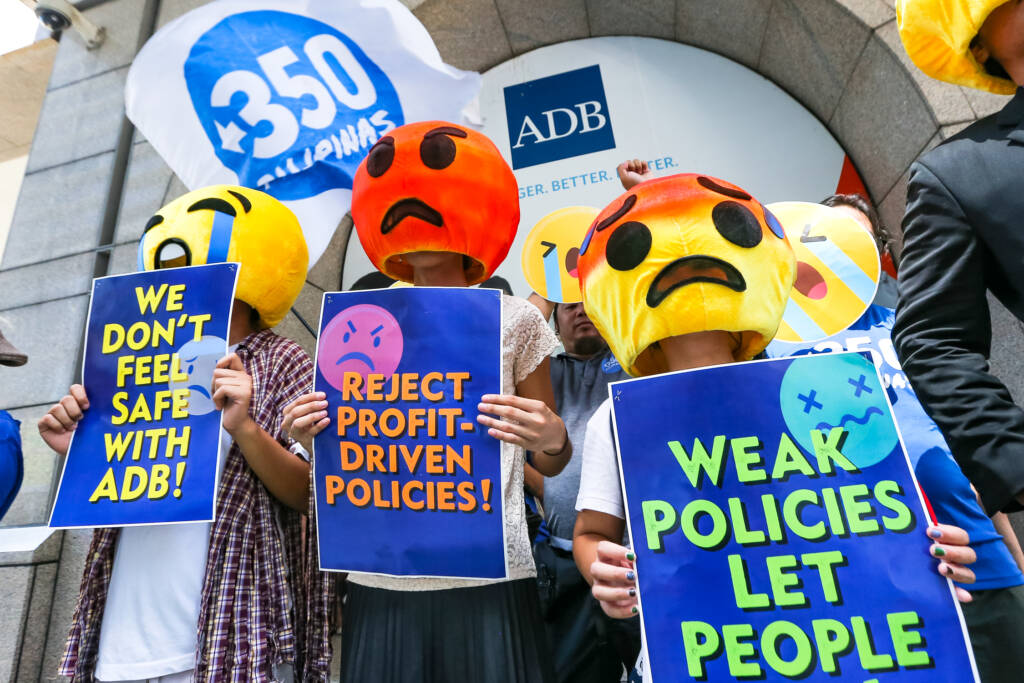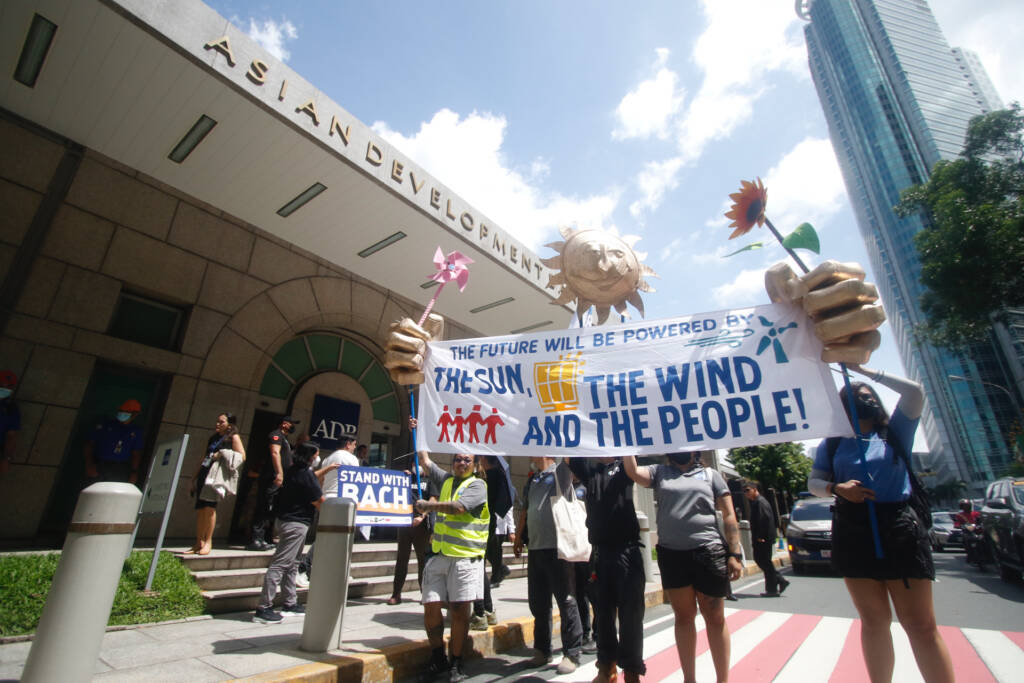by Chuck Baclagon, 350.org Asia
Every June, a charged scene unfolds outside the Asian Development Bank’s (ADB) headquarters in Manila. Activists and communities impacted by ADB-funded energy projects gather, a stark juxtaposition to the polished discussions within the Asia Clean Energy Forum which serves as a hub for energy stakeholders, that aims to steer the Asia-Pacific region toward swiftly transitioning from fossil fuels to renewable energy to mitigate climate change and secure our energy future.

On June 3, 2024 – CSOs held a press conference to announce the week of action to call the Asian Development Bank amid the Asia Clean Energy Forum (ACEF) to prioritize its shift towards a sustainable, low-carbon future in Asia. [Photo: Jawo Jayme]
Since its establishment in 1966, the ADB has promoted economic and social development across Asia and the Pacific. With 68 member countries, the ADB provides vital financial and technical assistance. Its crucial role is supporting developing nations as they transition to sustainable, low-carbon energy systems, aligning with the Paris Agreement’s objectives.
The Billion-Dollar Road to Decarbonization
Between 2016 and 2020, the ADB funneled $8.5 billion into clean energy, bolstering low-carbon transitions and improving energy access in the region. By late 2021, the Bank’s fresh Energy Policy had halted financing for new coal-fired power, acknowledging coal’s environmental and financial hazards. While fossil gas projects remain permissible under the new policy, this marks a significant shift towards cleaner energy. Looking ahead, the ADB has pledged up to $100 billion by 2030 to combat climate change, with a strong emphasis on renewable energy, aligning with their sustainable development and climate mitigation strategy.

CSOs Denounces ADB’s Draft Safeguards Policy, Call for Immediate Revisions / April 25, 2024.
Ahead of the ADB’s Annual meeting next month, civil society groups held a lightning rally in front of the main office of the Asian Development Bank (ADB) in Ortigas, Pasig City calling on the Asian Development Bank (ADB) to go back to the drawing board and overhaul the draft environmental and social framework (ESF) as written in its current form. Photo / Leo M. Sabangan II.
Despite these efforts, concerns persist regarding the ADB’s adoption of what many civil society organizations consider ‘false solutions’ like ammonia co-firing, hydrogen, waste-to-energy, and potentially nuclear. These approaches are hindrances to decarbonization, diverging from the goals in the Glasgow Climate Pact adopted at COP26. This pact calls for reductions in greenhouse gas emissions, phasing out unabated coal power, cutting methane emissions, and offering financial aid to emerging economies.
As of 2023, an estimated 350 million people in Asia, particularly in rural and remote areas of countries like India, Indonesia, and Bangladesh, still lack stable electricity access. Global challenges such as the COVID-19 pandemic and the energy crisis have impeded progress in expanding electricity access. To achieve net-zero emissions by 2050, a significant uptick in renewable energy capacity is imperative. Estimates indicate that nearly tripling global investments in renewable energy, with a target of around 8,000 GW of new capacity by 2030, is necessary to replace fossil fuels and sustain global electricity demand.

Last year, various groups have urged the ADB to shift its power to renewable energy and to stop funding fossil fuel projects. Photo: Aurora Malaya
The road ahead
Approaching 2030, achieving a balance between equity, urgency, and ambition in energy transformation is paramount. This entails excluding harmful energy solutions, prioritizing equitable investment in renewable energy, and ensuring transparency, accountability, and community consultation.
Pursuing climate action is not merely about meeting emission reduction targets set under the Paris Agreement; it is about fundamentally altering our development pathway to ensure that our country can thrive in climate change. This transformation must intertwine seamlessly with achieving other development goals, recognizing that robust community ownership of solutions is indispensable for any successful climate initiative. Our journey towards a sustainable future demands that action and progress in climate and development are compatible and mutually reinforcing.
To achieve this, the climate movement must lead the charge, relentlessly advocating for financial stimulus to transform our energy systems towards sustainability and equity. We must challenge the prevailing narrative that economic development is inextricably tied to fossil fuels through creative actions that speak truth to power. By capturing the popular imagination, we can demonstrate that decarbonization is necessary and entirely achievable. This dual approach of confronting entrenched interests and inspiring hope is essential for a just and sustainable future.
The climate crisis is not just about science, technology, and shifting to meet sustainability goals; it is intertwined with issues of poverty, inequality, and economic injustice. Addressing these challenges entails reimagining energy as part of a larger system transforming how power is produced, utilized, and distributed.

Central to this endeavor is the redirection of resources toward solutions that prioritize both people and the environment. This necessitates a rapid and fair shift towards a clean energy economy, empowering communities while curbing profit-oriented decisions that endanger individuals and the planet. The Asian Development Bank’s dedication to sustainable development and renewable energy is pivotal in reshaping the energy landscape of Asia and the Pacific, driving economic stimulus and paving the path towards a fossil-free future.